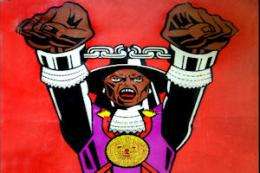School textbooks have political purpose, finds study

(PhysOrg.com) -- The simple school textbook is used by states to mould loyal citizens, according to a new study.
Dr Matthias vom Hau, from The University of Manchester, studied hundreds of books to reveal a less well known side to the everyday item used by schoolchildren across the world.
Concentrating on three Latin American countries but also the UK, Germany and the United States, he looked at books used to teach national history, citizenship, and English literature.
It was no coincidence, he said, that in all the countries he examined, similar nationalist messages - though in different contexts - changed at similar times over the past 150 years.
In Latin America as well as in other countries, he said, the criteria of the commissions of experts who go through 100s of textbooks is not only quality but political.
"Schools of course educate us and make us literate. But what you learn about national identity and history is highly regulated by Government and expert panels and thus they are an outcome of a complex political process," said the researcher based at The Brooks World Poverty Institute at The University of Manchester.
"School textbooks do not reveal the ‘facts,’ they convey particular visions of reality by emphasizing and downplaying certain aspects of the world.
“States usually take a major interest in textbooks and put a lot of effort into shaping what content gets printed.
“Historically, states have treated schools as places for cultivating national attachments and loyalty among their citizens."
He added: "But how teachers and students react is of course another thing: sometimes they reject what they teach or are taught, and the state’s message doesn't get through.
"But what is so fascinating is that different states have such similar ways of expressing their ideas about national identity and history though their textbooks.
"For example in the late 19th century, textbooks in Latin America were used to promote the idea that history was made by a few great men.
“During that period Latin American textbooks also portrayed European colonialism as something positive, as a civilising force.”
But according to Dr vom Hau, it all changed in the 1930s and 1940s when textbooks tended to abandon their former view and reflected major political change: class became important.
Policy makers throughout the world were influenced by the growing power of organized labor and the increased intellectual clout of materialist and structural interpretations of history. These changes, he said were reflected in the school textbook.
In Latin America, for example, textbook representations of Spanish colonialism abruptly switched to criticism of 300 years of foreign domination, blaming Spain for many of their problems.
In the 1980s and 90s school textbooks changed again with a more emphasis on cultural distinctiveness and sensitivity to ethnic minorities - again reflecting political changes.
But the process, he says, is not planned: "The way states decide what textbooks cover is actually a messy process driven by several actors and definitively not a conspiracy.”
More information: ‘Unpacking the school: Textbooks, teachers, and the construction of nationhood in Mexico, Argentina, and Peru’ will appear in the Latin American Resource Review 44 (3)
Provided by University of Manchester (news : web)

















